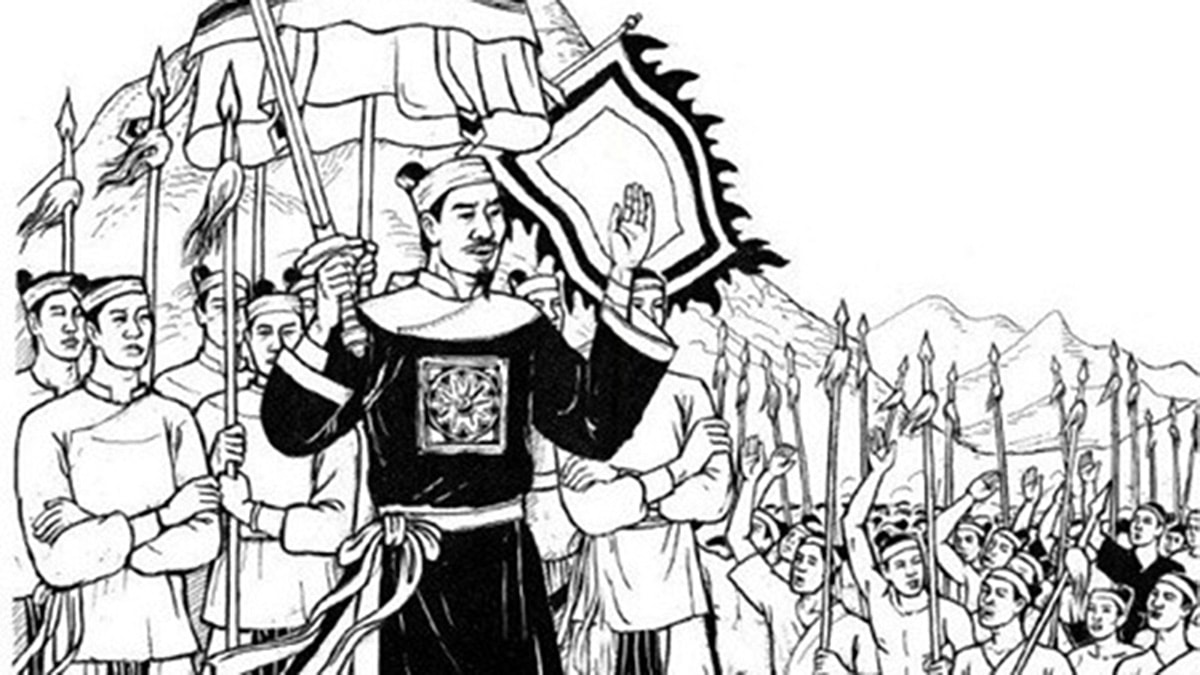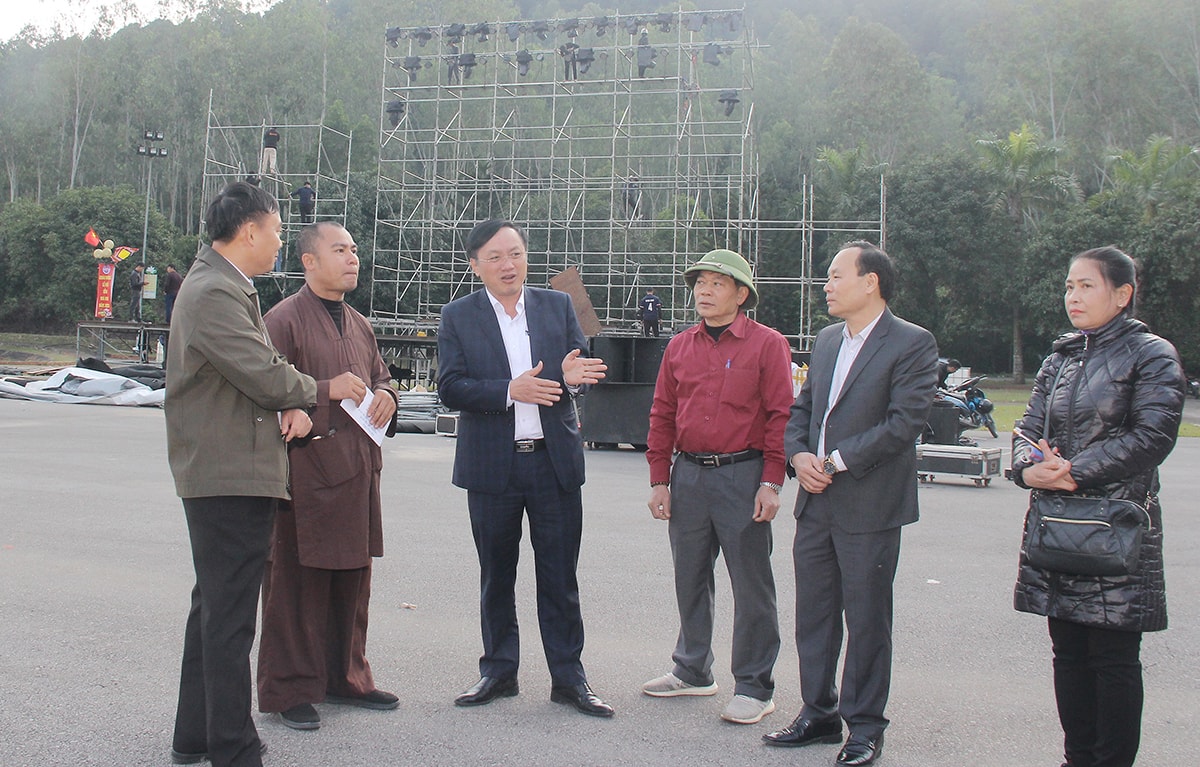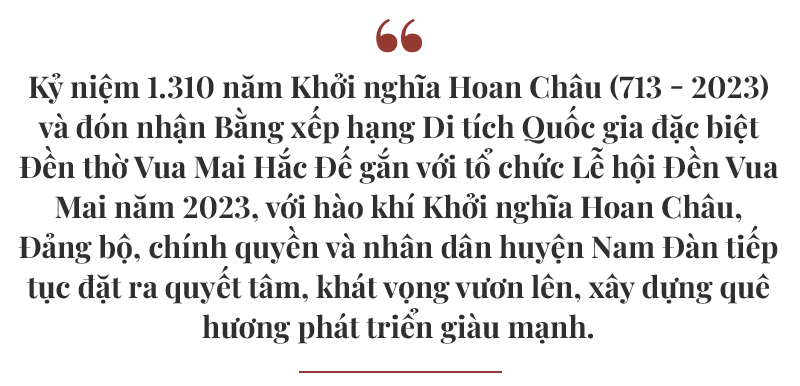


Throughout the history of the nation, our people have gone through many struggles for national independence, including the Hoan Chau Uprising (713 - 722) against the feudal domination of the North in the early 8th century, establishing the independent Van An State in the 8th century associated with the name of the cloth-clothed hero Mai Thuc Loan.
Mai Thuc Loan was born in the year of Canh Ngo (670), originally from Mai Phu village, Thien Loc district (now Mai Phu commune, Loc Ha district, Ha Tinh province). After becoming pregnant, Mai Thuc Loan's mother moved to Ngoc Trung village, Dong Liet commune, Nam Duong district (now Nam Thai commune, Nam Dan district) to live. Witnessing the people's misery due to the harsh and exploitative policies of the Tang Dynasty, with the desire to regain independence and autonomy for the nation, in the year of Quy Suu 713, Mai Thuc Loan raised the flag of uprising. He issued a proclamation denouncing the crimes of the Tang invaders and calling on the people to rise up and fight against the foreign invaders. In just a short time, under the active response of the people around the area, the uprising force increased rapidly, "within a week, near and far people responded, there were more than 100,000 soldiers". Not only did he recruit soldiers in the Hoan Chau region, he also gathered troops from 32 provinces, allied with the countries of Lam Ap, Chan Lap, Xao Oa, and Java to fight the enemy.

After overthrowing the ruling apparatus established by the Tang Dynasty in Hoan Chau, Mai Thuc Loan led a large army to liberate the entire Ai Chau (Thanh Hoa today), then marched straight to the Northern Delta, surrounded, attacked, and captured Tong Binh citadel (now the capital Hanoi). The country was free of foreign invaders, Mai Thuc Loan ascended the throne, proclaimed himself King Mai Hac De, and proceeded to build a government apparatus from the central court to the local level, issuing many important decrees: Abolishing high taxes and heavy duties imposed by the Tang Dynasty on the people of the districts and counties; ending all tribute ceremonies, each village plowed its own fields, and whoever worked enjoyed their own benefits. The people of the districts and counties throughout the country were excited and responded to the King's decrees.
The Hoan Chau Uprising with 10 years of independence (713 - 722) has an extremely great significance; is an important milestone on the path of fighting for national independence after 1,000 years of Chinese domination; is a powerful historical evidence, affirming the aspiration for independence and autonomy of our nation against foreign invasion and domination, has the effect of encouraging and adding great strength to generations of Nghe An people and the entire Vietnamese nation to inherit and promote in the struggle to protect, build and develop the homeland and country over the past thousands of years.

Mai Hac De's life and career originated from and were closely associated with the land of Nam Dan, "a famous and beautiful land with many heroes from ancient times". To remember and express gratitude for Mai Hac De's great contributions, Mai Thieu De ((Mai Thuc Huy - Mai Hac De's son) and the generals and people of Hoan Chau built a temple at Mai Hac De's tomb in Ram valley, Hung Son mountain, now part of Ha Long block, Nam Dan town and a temple to worship Mai Hac De in the center of the ancient Sa Nam area, now part of Mai Hac De block, Nam Dan town.

In addition to the tomb and temple of King Mai Hac De, there are also the following relics: The tomb of King Mai's mother (at De mountain, Nam Thai commune); the temple of King Mai's mother (at Con Chen cave, Nam Thai commune); Nam Son temple - Duc Ong temple, worshiping civil and military mandarins in the Van An court (at Nam Bac Son block, Nam Dan town); Mai Thieu De temple (on Dun mountain, Nam Dan town); Kha Lam communal house (in the old Nam Thuong commune, now Hung Son block, Nam Dan town); Van An citadel relic in Nam Dan town. The relics form the complex of King Mai Hac De Temple relics - a place that preserves evidence of the heroic years soaked in blood and bones of King Mai Hac De and his generals in the Hoan Chau uprising more than 13 centuries ago.
Comrade Nguyen Hong Son - Deputy Secretary of the District Party Committee, Chairman of the People's Committee of Nam Dan district affirmed: The Temple of King Mai Hac De is a long-standing cultural and spiritual work of the local people, a place to honor and pay tribute to the Emperor, the outstanding hero who liberated the nation, bringing the country's position to the same level as the North, and those who have contributed to the people and the country. Although it has gone through thousands of years with many ups and downs, through many restorations and repairs, up to now, the location of the Temple Relics of King Mai and King Mai's mother, and the civil and military mandarins in the Van An court has not changed. In particular, the relics are currently preserving 378 artifacts made of stone, wood, paper, porcelain, etc.; including 34 valuable antiques, typically the system of royal decrees, statues, thrones, tablets, etc. This proves that generations of people in the homeland of Nam Dan have a rich tradition of patriotism, national pride, respect for cultural and historical values, and the morality of "remembering the source of water when drinking", "repaying gratitude"; contributing to clarifying the history of the land, the nation and the locality for many centuries.

On December 29, 2023, the Prime Minister signed Decision No. 1649/QD-TTg on ranking the Mai Hac De King Temple Relic as a Special National Relic. This is evidence affirming the great values of the relic, not only in terms of history and culture but also in terms of profound political influence. This is the honor and pride of the Party Committee and people of Nam Dan district when the locality has another special national relic along with three special national relics: Kim Lien Relic Site, Hoanh Son Communal House, Phan Boi Chau Memorial Relic - the only district in the country with 4 special national relics.

Regarding the recognition of the Temple of King Mai Hac De as a special national relic, according to the Chairman of the People's Committee of Nam Dan district: In addition to the honor and pride, the Party Committee and people of Nam Dan district are also clearly aware of the responsibility to preserve and promote the value of the relic with many specific tasks and solutions in the coming time. Accordingly, the district will strengthen propaganda about the stature of the Hoan Chau Uprising, the great contributions of King Mai and his generals as well as the relic to all classes of people; mobilize resources to preserve, embellish and renovate the relic worthy of a special national relic, becoming an attraction for people and tourists nationwide to come and worship; organize the connection of 4 special national relics into a tour, linking the exploitation of the system of relics and unique intangible cultural heritages of festivals, customs, and practices, especially the intangible cultural heritage of folk songs Vi, Giam with the singing of Vi Phuong Vai, Vi Do Dua Song Lam...; contributing to promoting tourism development of the district according to Decision No. 17 of the Prime Minister on building Nam Dan district into a model new rural district in the direction of cultural development associated with tourism.



According to French documents, in the past, at the temple of King Mai Hac De, many festivals took place such as the death anniversary of King Mai Hac De (17/9 lunar calendar), the opening of Spring (15th day of the first lunar month), Thanh Minh (in the third lunar month), Doan Duong festival (5/5 lunar calendar), Trung Nguyen festival (15th day of the seventh lunar month), Thuong Tan festival (in the 10th month, the beginning of the harvest season), Lap Nghi festival (25th day of the 12th lunar month). In addition, during droughts or the three-year exams, those who passed or were promoted to official positions were held at the temple to present to King Mai and his soldiers with respect and gratitude. After that time and now, the temple still maintains the above festivals, but the largest festival is the King Mai Temple Festival, which takes place for 4 days, from the 13th to the 15th day of the first lunar month every year.
Regarding the Mai Hac De Temple Festival in 2023, according to comrade Vuong Hong Thai - Member of the Standing Committee of the District Party Committee, Vice Chairman of the People's Committee of Nam Dan district, it will be organized on a provincial scale with many unique contents, in which the main highlight is the celebration of the 1,310th anniversary of the Hoan Chau Uprising and receiving the Certificate of ranking as a special National Monument for Mai Hac De Temple. Traditional cultural and religious activities at the festival will continue to be maintained at 4 relics (tomb and temple of King Mai Hac De, Nam Son Temple (Duc Ong Temple), Kha Lam Communal House, mausoleum and temple of King Mai's mother) from February 2 to 5, 2023 (ie January 12 to 15, Quy Mao year). Including the water procession, the inauguration ceremony, the proclamation ceremony, the great sacrifice ceremony, the opening ceremony and incense offering ceremony in memory of King Mai (associated with the 1,310th anniversary of the Hoan Chau Uprising and receiving the Certificate of ranking the Temple of King Mai Hac De as a special National Monument), the flower lantern releasing ceremony and the thanksgiving ceremony.


Along with the ceremony, this year's festival was organized on a larger scale and more systematically, after 2 years of suspension due to the Covid-19 pandemic, to create an environment and cultural space for local people and tourists from all over to Uncle Ho's hometown to participate, contributing to creating an exciting, joyful atmosphere, motivation to strive for the year of Quy Mao 2023 with many new successes and results. Including youth camp; traditional wrestling tournament; open men's volleyball tournament; organizing folk games such as human chess, card chess, tug of war, cockfighting, merry-go-round...; organizing a culinary week, booths to introduce, promote and supply OCOP products, typical products of Nam Dan district.


